The Fall of Ancient Egypt
What led to the fall of ancient Egypt – a powerful and technologically advanced civilization? How did what we know as ancient Egypt evolve into the nation of Egypt we know today? To investigate, this article touches on a number of factors that influenced ancient Egypt over the latter part of its reign and discusses how they together led to the fall of ancient Egypt.
First signs of weakening
While pinpointing the specific factors that led to the demise of the ancient Egyptian civilization is difficult, several early signs of weakening did emerge, leading to the eventual fall of ancient Egypt.
The first sign of weakening was a loss of military power and lackluster military development due to available natural resources. While other surrounding and growing empires were able to forge iron from resources available locally, Egypt lacked access to ore and other necessary metals. With stronger weapons, Egypt became vulnerable to more powerful competing armies.
Additionally, political conflicts led to the eventual split of the empire into northern and southern areas and a protracted civil war between the two regions. Together, these forces signaled the initial fragmentation of the Egyptian state as it was and opened the door for other growing empires to invade and take Egyptian territory.
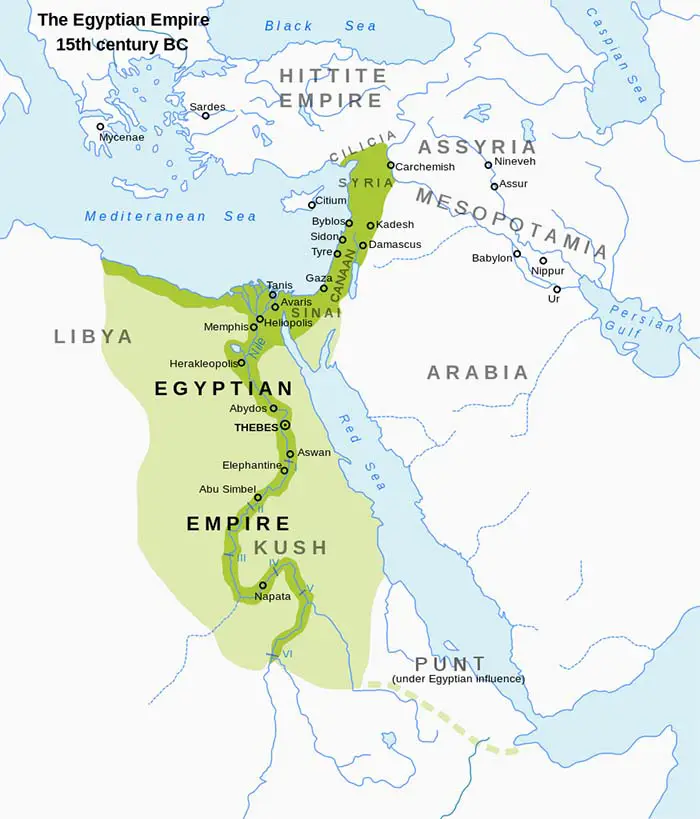
© Andrei Nacu, Jeff Dahl - Extent of ancient Egyptian territories 15th century BC
Political context
Coupled with the lack of natural resources to support their military power, several key political events dramatically influenced the power balance in Egypt, eventually dividing the nation.
The first was the shifting role of the Pharaoh. Pharaoh Ramses III was murdered, leaving a power vacuum that allowed King Amenmesse to claim territory and secede from the empire, leaving Egypt divided into two states.
After a long civil war and several attempts to reunite Egypt, the empire remained split with a loose association between the governments of the two regions.
Economic context
Economic factors also contributed to the fall of ancient Egypt. Like many nations that end up losing power, economic disparity in ancient Egypt pushed everyday citizens to their limit.
Throughout the ancient Egyptian society, religion played a major role in nearly all aspects of Egyptian life. However, as economic disparity between the population and the religious elite grew, citizens grew more displeased. At one point religious leaders controlled 30% of Egypt's land, giving them a disproportionate share of the nation's income. Conflicts over wealth distribution led to questions about religion as well.
In addition to the distribution of wealth, military conflicts towards the end of the ancient Egyptian era were incredibly expensive. Funding massive military investments strained the government's capital and further weakened the state. Coupled with other issues, the lack of economic health made Egypt less able to handle other stresses, eventually leading to the fall of ancient Egypt.
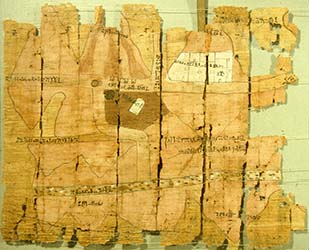
Fragment of a Mining Papyrus
Wars at the end of the Egyptian empire
While the devastating civil war significantly influenced the health of the Egyptian state, other military conflicts further weakened the empire and eventually led to its total collapse. In approximately 671 BC the nearby Assyrians invaded Egypt and reigned until about 627 BC.
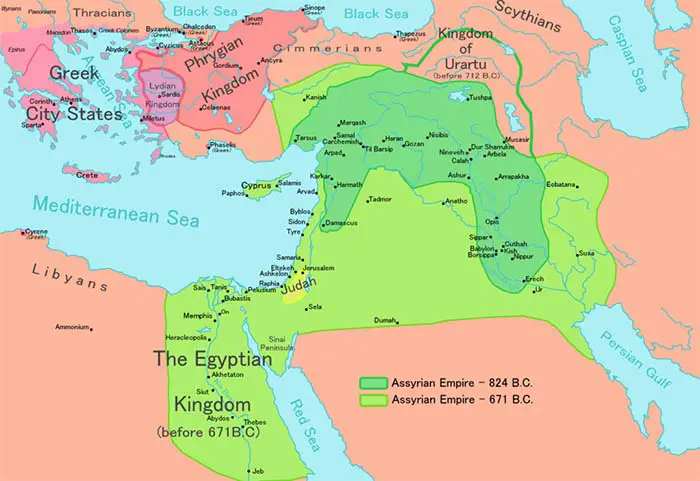
Egypt in the Assyrian Empire
After the decline of the Assyrian Empire, Egypt was invaded by Persia – a growing power in the region. Unfortunately, Egypt was unable to defend against the Persians and significant land was lost – Egypt came under Persian rule for nearly a century.
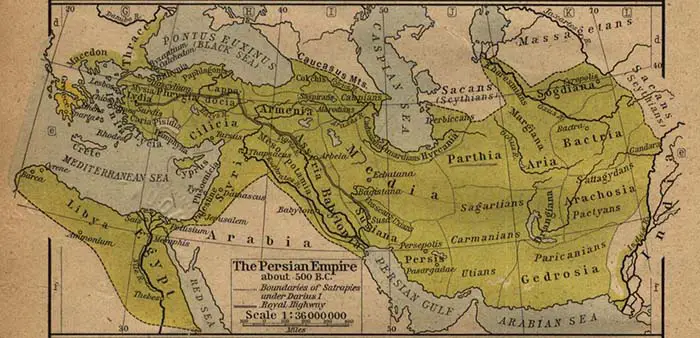
Egypt in the First Persian Empire
Climate change and famine
During this time period, the Egyptian climate contributed to the fall of ancient Egypt in other ways. The Nile river, which was the primary source of water for drinking and crop irrigation, was a temperamental river, known for flooding and periods of low water levels.
Over a span of approximately one hundred years, unseasonably cold and dry weather affected Egypt. Colder weather stressed typically warm weather crops and low rainfall caused water levels in the Nile to fall. Both factors together caused widespread hunger and hundreds of thousands of Egyptians died from dehydration and starvation.
While experts believe the low water in the Nile was the primary influence for the fall of ancient Egypt, during the later period of the empire's existence, a two- to three-decade period was marked by erratic flooding of the Nile, destroying crops and starving the people dependent upon them. While years of flood alternated, the inconsistent conditions made life extremely difficult for these ancient people and a significant number died as a result.
Aftermath and re-consolidation
At the end of this extended period of political and economic unrest and devastating climate issues, Egypt had lost most of its land and became a mere province within the Persian empire, hundreds of thousands of its people had died, and the public was increasingly dissatisfied with both their political and religious leaders.
Christianity began to spread through Egypt and with it the Greek alphabet – both transforming key features of the ancient culture that we know and recognize today. Adopting a new religion, where the old religion had been a major cultural force in the Egyptian empire, led to the end of practices such as mummification, that the ancient Egyptians were well known for.
Similarly, adoption of the Greek alphabet led to disuse of hieroglyphics, another key feature of Egypt we have with us today. These shifts signaled the true fall of ancient Egypt, although the forces that drove that decline had been operating for a considerable time period.
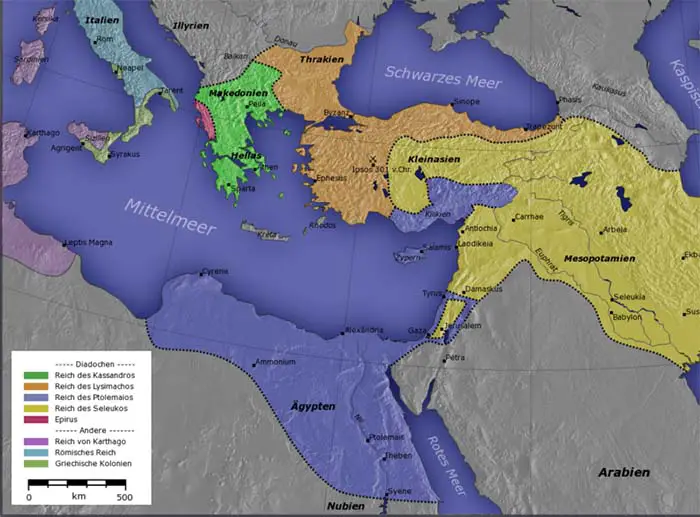
© Captain_Blood - Egypt During the Ptolemaic Period
Facts about the fall of ancient Egypt
- The factors leading to the decline of ancient Egypt were largely uncontrollable.
- A civil war coupled with invasions by the Assyrians weakened the Egyptian military allowing the Persian empire to successfully invade and take over Egypt.
- Economic disparity led to unrest among the population, leading to dissatisfaction with both politics and religion.
- Severe climatic shifts decimated crops and hundreds of thousands died in the famines that resulted from these changes.
- Adoption of Christianity and the Greek alphabet led to the loss of key cultural features such as notable religious traditions and use of hieroglyphics.
- The ancient Egyptian empire lasted approximately 3000 years before finally falling from power.
